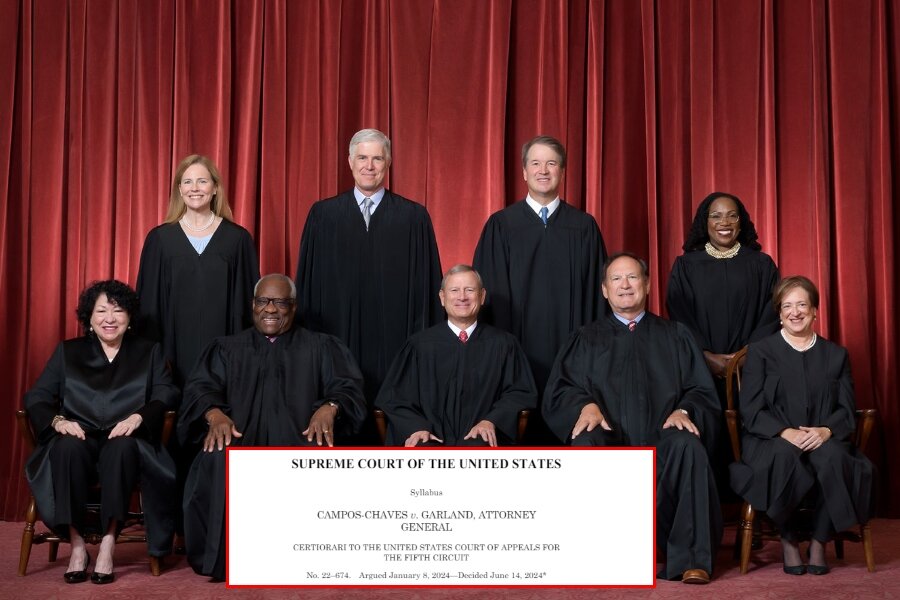The Supreme Court issued a 5-4 ruling against three illegal aliens challenging their deportation orders in the United States. They argued they were not properly notified of their removal hearings in federal immigration court.
When Esmelis Campos-Chaves, Varinder Singh, and Raul Daniel Mendez-Colín did not appear before federal immigration judges, they were ordered deported in absentia. In each instance, the Department of Justice (DOJ) initially sent Notices to Appear (NTA) for immigration court that did not specify the hearing’s time and location.
Later, the DOJ sent notices of hearings to each of the individuals, specifying the time and place they were required to appear before a federal immigration judge. Despite this, none of the men attended their court hearings, resulting in their deportation orders being issued in absentia from the United States.
Each individual then sought to have their deportation orders overturned, arguing that the DOJ had not adequately notified them of their immigration hearings. The Fifth Circuit rejected one of the petitions, while the Ninth Circuit ruled in favor of the other two individuals facing deportation.
On Friday, Justice Samuel Alito wrote for the majority, determining that the DOJ had indeed provided adequate notice of immigration hearings to each of the individuals in question, thereby precluding them from seeking to overturn their deportation orders:
Campos-Chaves, Singh, and Mendez-Colín all received “notice in accordance with paragraph (1) or (2)” for the hearings they missed, and thus their in absentia removal orders may not be rescinded on that ground. The Government concedes that none of them received a compliant NTA. Each did, however, receive a “notice in accordance with paragraph . . . (2),” and each notice met all of the requirements for a notice under that provision. After receiving a defective NTA, each alien received a notice that provided a specific time and place for their removal proceedings. Those notices provided “new” times, and thereby “change[d]” the time and place of their removal proceedings, within the meaning of §1229(a)(2). [Emphasis added]
…
When the Government seeks to remove an alien, it is required to notify the alien of the time and place of the removal hearings. Title 8 U. S. C. §1229(a) describes two types of notice—an initial notice to appear under paragraph (1), and, “in the case of any change or postponement in the time and place of” the removal proceedings, a notice of hearing under paragraph (2). When an alien fails to appear at his removal hearing despite receiving such notice, he “shall be ordered removed in absentia” if the Government can make certain showings. §1229a(b)(5)(A). The alien can seek to have that order rescinded, however, if the alien can demonstrate that he “did not receive notice in accordance with paragraph (1) or (2) of [§1229(a)].” [Emphasis added]
We granted certiorari in these cases to consider what it means to “demonstrat[e] that the alien did not receive notice in accordance with paragraph (1) or (2).” §1229a(b) (5)(C)(ii); 600 U. S. _ (2023). Each of the aliens in these cases argues that he may seek rescission because he did not receive a notice to appear that complies with paragraph (1). We hold that, to rescind an in absentia removal order on the ground that the alien “did not receive notice in accordance with paragraph (1) or (2),” the alien must show that he did not receive notice under either paragraph for the hearing at which the alien was absent and ordered removed. Because each of the aliens in these cases received a proper paragraph (2) notice for the hearings they missed and at which they were ordered removed, they cannot seek rescission of their in absentia removal orders on the basis of defective notice under §1229a(b)(5)(C)(ii). [Emphasis added]
Alito was supported by Chief Justice John Roberts, along with Justices Thomas, Kavanaugh, and Barrett. Justice Jackson wrote a dissenting opinion, joined by Justices Sotomayor, Kagan, and Gorsuch.
The case is Campos-Chaves v. Garland, No. 22-674, in the Supreme Court of the United States.
Share your thoughts by scrolling down to leave a comment.













